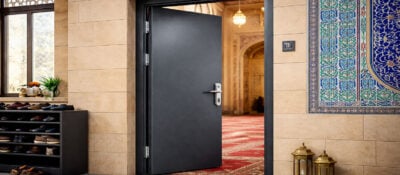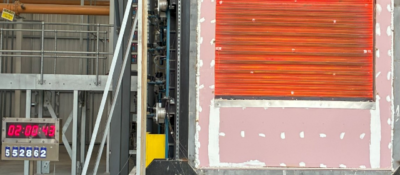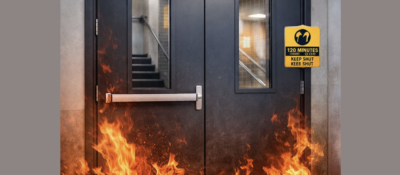Security doors are an essential component for safeguarding properties, offering both a physical barrier and a visual deterrent to potential intruders. In this section, we explore the significance of steel doors and delve into the security ratings that categorise their defensive capabilities.
Steel security doors are the bulwark of property protection, particularly prised for their robust construction and resilience. These doors are crafted from heavy-duty steel, which ensures their ability to thwart forced entry and endure severe weather conditions. Additionally, they come equipped with a range of hardware and security options, including robust frames, hinges, and complex locking mechanisms that are challenging for intruders to compromise (Security Direct UK).
The use of steel security doors is widespread across various settings, from commercial security doors for businesses to industrial security doors for factories, and even extending to apartment security doors for residential buildings. They not only fortify the entrance but also contribute to the energy efficiency of a property by insulating against drafts and minimizing heat loss, thereby serving as a durable and cost-effective investment for property owners who prioritise safety and comfort (Security Direct UK).
Security ratings for doors are a standardised measure of their effectiveness against unauthorised access. Steel doors are independently attack-tested by organizations such as the Loss Prevention Certification Board (LPCB) to LPS1175 Security Levels 1-4. These levels are part of the Secured By Design initiative, which is the preferred specification of insurance companies and police authorities due to its rigorous testing standards (Security Direct UK).
The security ratings are determined by evaluating the door's resistance to various attack methods, including physical force, drilling, cutting, and lock picking. The ratings are structured from basic security (Level 1) to high security (Level 4), with higher levels offering enhanced protection against sophisticated and determined break-in attempts. The table below provides a simplified overview of these ratings:
| Security Rating | Type of Protection |
|---|---|
| Level 1 | Basic Security |
| Level 2 | Moderate Security |
| Level 3 | Substantial Security |
| Level 4 | High Security |
These ratings ensure that property owners can make informed decisions when selecting the appropriate level of security for their premises. High-security doors that have undergone such stringent testing and certification are typically installed in areas where top-tier security is paramount. For more information on the different levels and their specific features, security door suppliers can provide detailed guidance to match the security needs of any property.
Steel security doors are renowned for their robust construction and superior performance in protecting properties. They offer a range of benefits that go beyond just security, including durability and energy efficiency, making them a practical investment for property owners.
Steel security doors are constructed from heavy-duty steel, which provides exceptional durability. They are designed to withstand forced entry attempts as well as harsh environmental conditions, ensuring long-term performance without degradation. The resilience of these doors to weather extremes makes them an ideal choice for properties located in areas prone to severe weather events.
The durability of steel doors is further enhanced by their resistance to common issues such as warping, rotting, or shrinking that can affect doors made from other materials. This makes them a low-maintenance option for commercial security doors, industrial security doors, and retail security doors where functionality and longevity are key considerations.
Apart from their strength, steel security doors also contribute to the energy efficiency of a property. They form a tight seal when closed, preventing drafts and reducing heat loss. This insulation capability helps in maintaining a comfortable indoor temperature, potentially lowering heating and cooling costs for the property.
In terms of safety, steel security doors are designed to offer a robust barrier against unauthorised access, enhancing the security of the premises. They feature advanced locking mechanisms, reinforced frames, and sturdy hinges that are engineered to resist various types of forced entry tactics. These safety features are critical for businesses and homes alike, providing peace of mind and an added layer of protection.
The combination of energy-saving properties and enhanced security measures makes steel security doors not only a sound choice for safeguarding premises but also for improving the overall safety and efficiency of a property. For property owners looking for additional security options, high-security doors that have been tested and certified by independent organizations, such as LPCB LPS1175, offer an even higher level of protection.
For more information on the durability and energy-saving benefits of steel security doors, or to learn about the different types and specifications available, consider reaching out to security door suppliers who can provide expert advice tailored to your needs. Additionally, ensure that your steel door is fitted correctly by following proper installation guidelines to maximise the benefits it offers.
Fire-rated steel doors are an integral component of a building's fire management strategy, offering a robust barrier against the spread of fire and smoke.
The primary purpose of fire-rated steel doors is to contain and prevent the spread of fire within a building, safeguarding exit routes for occupants while providing access for emergency services. Constructed from steel and often filled with materials like gypsum or vermiculite, these doors are a critical safety feature in commercial, industrial, and residential buildings. They are commonly placed in high-risk areas, including stairwells, corridors, and storage rooms, to compartmentalise and hinder the progression of flames and smoke, thereby protecting lives and property.
To ensure the effectiveness of fire-rated doors, they undergo stringent testing and certification by independent bodies. These tests assess the door’s ability to endure extreme temperatures and direct exposure to flames for a specified period. The duration, typically measured in minutes or hours, represents the door's fire rating.
| Fire Rating | Description |
|---|---|
| 30 minutes | Suitable for certain residential and commercial applications |
| 60 minutes | Common for higher risk areas in residential and commercial settings |
| 120 minutes | Often used in specialised industrial environments or where maximum protection is required |
The certification process ensures that high-security doors comply with fire safety standards and are capable of withstanding fire for the rated duration. Buildings may require different types of fire-rated doors, from fully steel versions to ones with glazed panels, each selected based on the specific fire safety requirements of the area they protect.
For more information on choosing and installing the correct fire-rated door for your premises, including commercial security doors and industrial security doors, consult our guides on security door installation and connect with reputable security door suppliers. Proper selection, installation, and maintenance are essential to ensure these critical safety features perform as expected during a fire emergency.
Selecting the right steel door is a critical decision for business owners who aim to enhance the security of their property. With a multitude of customization options and factors to consider, understanding what sets different doors apart is essential to making an informed choice.
Steel doors can be tailored to meet specific aesthetic and functional requirements. They can be customised in various ways, including different colors, types of panels or windows, and styles to match the architectural design of a home or building. This flexibility allows steel doors to integrate seamlessly into diverse design contexts, making them a versatile option for both practicality and style.
Customization options may include:
For a deeper look into the available customizations for steel doors, visit steel security doors.
When buying a steel door, essential considerations include:
These factors are crucial in determining the appropriate door for a particular setting, whether it's for commercial, industrial, retail, or residential applications.
| Factor | Consideration |
|---|---|
| Security Level | High-security options for enhanced protection |
| Environmental Resistance | Galvanised or stainless steel for longevity |
| Insulation | Energy-efficient cores for thermal regulation |
| Maintenance | Low-maintenance surfaces for ease of care |
| Aesthetic | Customizable elements for design cohesion |
For additional guidance on the factors to consider when choosing a steel door, refer to Security Direct UK.
Selecting the right door involves balancing the need for security with the desire for a door that complements the property's architecture. With the variety of types available, such as Personnel Doors, Fire Exit Doors, Louvered Doors, and Communal Entrance Doors, each serving different functions, the selection process becomes a tailored experience. Further assistance can be sought from security door suppliers to ensure the choice aligns with the specific needs and requirements of the space. Once chosen, professional security door installation is pivotal for optimal performance and security efficacy.
Steel doors, recognised for their robustness and integral security features, serve a crucial role in safeguarding properties across diverse environments. Their applications extend from commercial security doors to industrial security doors and even residential settings. Let's explore how these sliding security doors are utilised in different scenarios.
In the realm of commerce and industry, security is paramount. Steel doors are often the bulwark against intrusions and ensure the safety of assets and personnel. These doors have been independently attack-tested by the LPCB to LPS1175 Security Levels 1-4, making them Secured By Design, a specification endorsed by Insurance and Police (Security Direct UK).
| Setting | Purpose | Security Level |
|---|---|---|
| Banks | Protect assets | High (LPS1175 Level 4) |
| Government Buildings | Secure sensitive information | High (LPS1175 Level 4) |
| Data Centers | Guard against data theft | High (LPS1175 Level 4) |
| Retail Stores | Deter burglary and vandalism | Moderate to High (LPS1175 Level 2-4) |
These high-security doors are engineered to resist determined attacks using tools and force, providing peace of mind for business owners. The versatility of steel doors allows for their use in specialised applications, such as fire exits, louvered doors for ventilation, and communal entrances, each tailored to the unique requirements of commercial and industrial spaces.
While steel doors are often associated with commercial and industrial security, they have also carved a niche in residential security. Homeowners are increasingly opting for steel secure entrance doors due to their unparalleled strength and ability to withstand extreme weather conditions. Additionally, their potential for customization allows them to blend seamlessly with various architectural styles (Security Direct UK).
In residential applications, steel doors not only enhance security but also contribute to energy efficiency by preventing drafts and reducing heat loss. They come in various designs, including the popular sliding security doors that offer a blend of functionality and aesthetic appeal.
| Residence Type | Function | Feature |
|---|---|---|
| Apartments | Guard against break-ins | Customizable design (Apartment Security Doors) |
| Houses | Weather resistance | Energy efficiency |
| Townhouses | Fire safety | Fire-resistant options |
The adaptability of steel doors means they can serve as a primary security measure in homes while also offering additional benefits such as fire resistance, which is crucial for areas at high risk of fire such as kitchens or garages.
Whether for a business facility or a private domicile, the selection and installation of the right steel door are vital. Business owners and homeowners alike should consult with security door suppliers and follow proper installation guidelines to ensure optimal performance and longevity of their steel doors.
Ensuring the longevity and proper functioning of steel security doors is critical for maintaining a high level of security for any property. Regular maintenance and correct installation are key components of security door effectiveness.
Steel security doors have an impressive lifespan due to their resistance to environmental factors, including severe weather conditions, rust, and corrosion Security Direct UK. To maximise the service life of these doors, it is important to conduct periodic inspections and maintenance. Here are some care tips to ensure the durability of your steel doors:
Following these steps will contribute to the security door's effective performance and safety features, keeping your property secure for years to come.
The benefits of a security door can only be fully realised when it is installed correctly. Knowing the proper installation guidelines is essential for the door to function as designed, especially for specialised doors like fire-rated steel doors. The installation process typically includes:
For detailed guidelines on security door installation, refer to the manufacturer's instructions or consult with a professional installer. Proper installation not only enhances the security of your property but also ensures compliance with regulations and warranty requirements. Whether you're looking for commercial security doors, industrial security doors, retail security doors, or apartment security doors, correct installation is paramount.

A practical guide to securing mosques, synagogues and churches with steel doors, security grilles an...

Installing a fire shutter over a servery hatch? Learn why floor-level testing may not cover countert...

Security Direct was appointed to supply and install a series of FD120 steel fire doors with integrat...